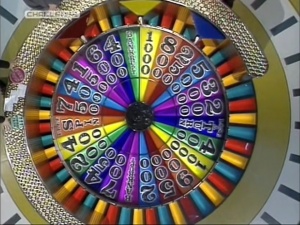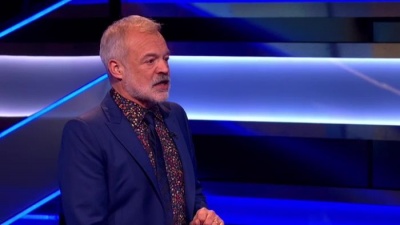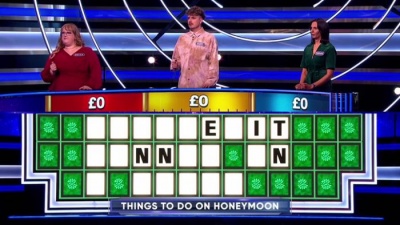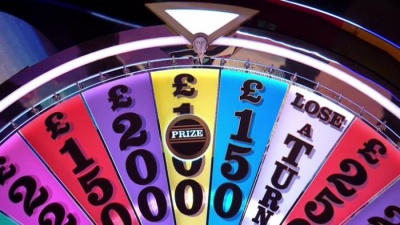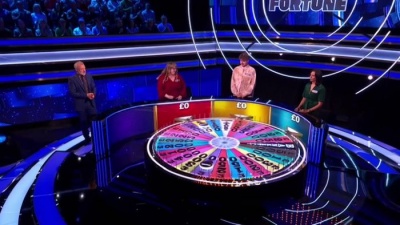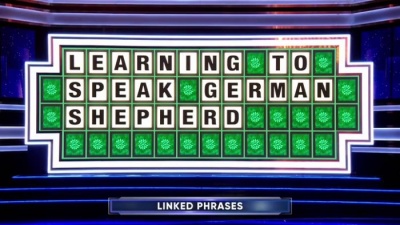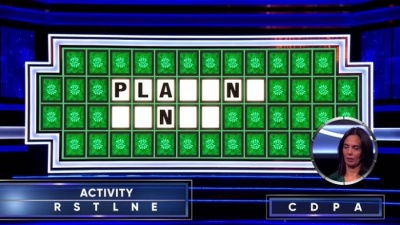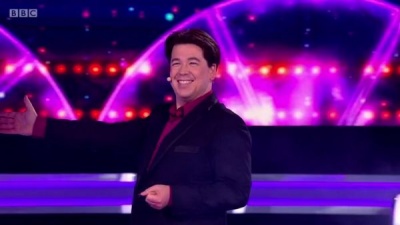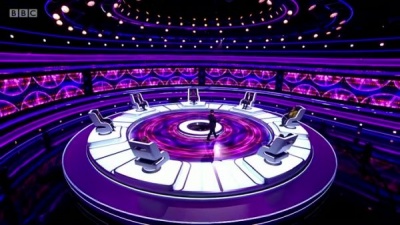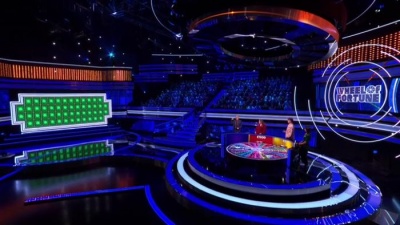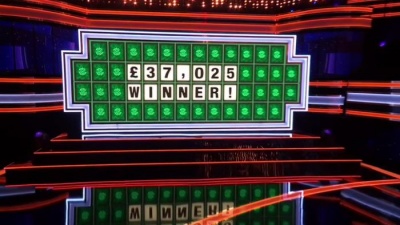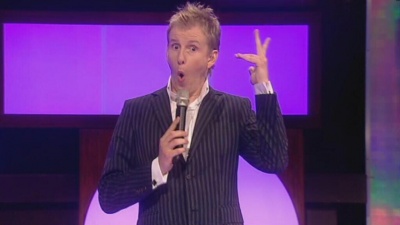Weaver's Week 2024-01-28
(Created page with 'Last week | Weaver's Week Index | Next week <div class=square style="float:right;clear:right;"> [[Fil…') |
(→In other news: I still cannot hear a second R, but it may be there. This edit softens the story to "did we hear correctly?") |
||
| Line 152: | Line 152: | ||
Never mind, Fox can always go on ''Wheel of Fortune''. | Never mind, Fox can always go on ''Wheel of Fortune''. | ||
| - | We may | + | We may - possibly - have found an error in '''[[House of Games (3)]]'''. On Wednesday's edition, Anne-Marie Imafidon was asked to spell an Aussie kingfisher. This column heard her spelling was "Kookabura"; it was displayed as the correct "Kookaburra" with two Rs at the end. If we're correct, and not suffering from a bad edit or bad hearing (and another UKGS editor swears there were two Rs rolled together), this would be the first factual or adjudication mistake in 600 episodes. ''House of Games'' has a tremendous level of accuracy. |
Sad news from the '''[[Eurovision Song Contest]]''', as TVR have confirmed they won't take part this year. The broadcaster, which serves viewers in Romania, will allocate the money to other projects. | Sad news from the '''[[Eurovision Song Contest]]''', as TVR have confirmed they won't take part this year. The broadcaster, which serves viewers in Romania, will allocate the money to other projects. | ||
Revision as of 18:53, 28 January 2024
Last week | Weaver's Week Index | Next week
If it ain't broke, don't fix it.
This is a job for Bob the Builder.
Contents |
Wheel of Fortune (2)
Sony / Paramount Global Content Distribution / Whisper North for ITV, from 6 January
Back in 1988, ITV had a new primetime game show. Wheel of Fortune was brash, colourful, and proved that Nicky Campbell was so smart he could pretend to be foolish. Over the next 15 years, Wheel of Fortune became a fixture on the schedules, both in primetime and as a fun daytime filler.
According to the official blurb, Wheel of Fortune is based on the game of Hangman, with players hoping to solve a word puzzle. This is strange, because surely the star of the show is the massive wheel in the middle of the set. But then we remember that Wheel of Fortune is a Yankee show, and they use a version of English designed to obfuscate – other irksome solecisms include "entree" for "main course", "air fryer" for "small fan oven", and the recent headline "Congress boots the government funding can down the road again". We could go on.
So, three players, and one host. Graham Norton is the host. You'll know him from The Graham Norton Show, a celebrity chatter fest seen all over the world. He's previously been a stand-up comedian, did most of the Andrew Lloyd Webber casting shows, and has also worked on the Eurovision Song Contest for the BBC.
Graham Norton hasn't worked with the general public since Totally Saturday in 2009. Being the most consummate television professional, Graham can work perfectly well with the general public, just as he can work with any star on the planet. It's just that Graham isn't as excellent with the public, he doesn't quite gel with them. Maybe it's us projecting our problems onto the host, maybe it's simply that nobody can shine because there's very little for any host to do on Wheel of Fortune.
Anyway. After we briefly meet the contestants, we have three "toss-up" puzzles. Here's another piece of Yankee obfuscation: the puzzles are not actually tossed up into the air. Instead, we see a board showing spaces. One letter will fill each space, so we know the answer begins with a 9-letter word, then a 6, a 2, a 1, and ends with a 5.
We're also told the category: in this example, "things to do on honeymoon". One by one, letters will appear in the puzzle. As soon as a player thinks they know what the answer is, they can buzz in. £500 for a correct answer – and that money is theirs to keep whatever happens.
There are three of these little puzzles to begin the programme. It's a great way to get the idea of these Hangman-style puzzles: far better to show than to tell. Only after we've seen these stumpers answered can we have a bit more of a chat with the players.
And then we're into the main game. Another puzzle is set, and again we can work out the lengths – perhaps 5, 6, 10. There's a clue – "cute, small, and noisy". Hmm, "Bruno Brooks limousines" would fit: the cars are cute, the DJ is small, and both can be a bit noisy.
But we don't want to solve just yet, because there's more money to be won elsewhere. One of the contestants spins the titular Wheel of Fortune. It's a massive wheel, with 72 possible stopping positions, grouped into 24 wedges. Most of the wedges have a cash value, various amounts from £100 to £500.
Let's suppose that the wheel stops in the £400 wedge. Our contestant guesses a consonant that might appear in the puzzle. If it's there, they are given £400 for each time it appears. You've guessed "T" and there are three "T"s? You've got 400, 800, 1200 quid in your bank. Keep spinning, keep identifying letters, keep running up the bank.
However, if the letter isn't in the puzzle, that's it and the turn ends. Play passes to the next contestant around the wheel. Eventually, someone will have enough of an idea to complete the puzzle, and solving the puzzle means they get to keep what's in their bank – the other two players lose the money in their bank for this round.
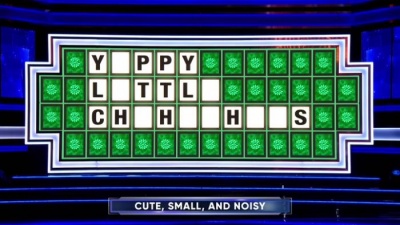 The puzzle gets ridiculously easy by the end. This is deliberate, to let viewers think they're smarter than the contestants - but the contestants want to rack up money.
The puzzle gets ridiculously easy by the end. This is deliberate, to let viewers think they're smarter than the contestants - but the contestants want to rack up money.
There are other wedges – "Free spin" will give a free spin, and allow a player to continue playing if they guess a false letter. Or if they hit one of the "Lose a turn" wedges – these end a contestant's go at once. "Spot prize" wedges contain a small prize – such as a weekend away somewhere posh – you'll get these if you land on it and guess a consonant correctly. There's also the dreaded "Bankrupt", which empties a player's account for this round and play goes to the next person.
And that's basically Wheel of Fortune. Repeat that for a few more rounds, let the top player try for a big prize, and you've got a perfectly serviceable show, right? Wrong.
Why doesn't Wheel of Fortune work?
Let's start at the very beginning. To the ITV audience, Wheel of Fortune means David Pringle and Bob Heatlie's theme tune: glamorous, jazzy, very late-80s synths and computerised drum beats. It's instantly memorable, and closely identified with the show. This version uses some generic guff provided by format owners Sony.
Now, we can understand that Whisper might want to make it very clear that this isn't Wheel of Fortune from the last century, and the introduction tune would help set the mood. However, Messrs. Pringle and Heatlie both wrote some fabulous and enduring earworms (Mr. Heatlie wrote "Merry Christmas everyone" for Shakin' Stevens), and Norton's Wheel isn't the same without it.
We're also grumping about the plethora of "toss-up" puzzles. Three at the start of the programme, and after every single ad break. Every second they're having one of these "toss-up" puzzles, they're not spinning the wheel. It's almost as if they don't want to show the titular circle.
And when they do deign to play a puzzle, the editing is slightly wrong. We see the puzzle board for a beat too long, even while we hear the wheel spin in the background. What are we meant to be watching, Green Screen With Spaces And Letters or Wheel of Fortune. You've got a massive wheel, you're finally using it, let us see the darned thing spin!
The puzzles themselves are more complex than in the nineties, and this is no bad thing. Where once we might have had "Demis Rousos" as an answer, we now get "Yappy little chihuahuas" – or some Answer Smashes, two phrases overlapping by a common word. Everything is a bit bigger, and it means the puzzle takes a bit longer to solve. There's a three-word crossword part-way through, which is an interesting idea.
Prizes are a bit bigger, too. Everyone keeps the money they bank from solving the puzzles, including the people who don't win the show. They want to splash a bit of cash around, we reckon £15,000 in the main game, with a minimum £20,000 for solving the final puzzle. Top prize is "only" £50,000, evidently they don't want to splash too much cash around.
To introduce the concept of the final round, they play one of the earlier rounds for a holiday to somewhere exotic. Whoever solves the main puzzle plays a bonus round. Solve a short clue in ten seconds. You'll get ETNRSL, then pick three further consonants and another vowel. Win or lose, the sponsor for the holiday gets their plug on ITV, and the sponsors for the spot prizes get their plugs on ITV. It's a commercial show on a commercial network, we are grimly resigned to this kind of in-yer-face advertising.
Wheel of Fortune has moved into primetime, and it's now a full hour long. This is too long. What was a fun half hour programme with Nicky Campbell or Bradley Walsh has turned into an elongated slog with Graham Norton. He doesn't have a co-host, someone to turn or touch the letters, and has to keep the programme going by himself. Norton is at his best when he's bouncing off someone – the guests on his chat show, the host and performers at Eurovision. Here, he's struggling a bit, and doesn't seem to be at his most confident.
Wheel Versus Wheel
Wheel of Fortune doesn't exist in a vacuum. There are other Saturday night primetime shows involving a wheel and a chatty comedian. How does Wheel of Fortune compare to The Wheel?
Host – Graham Norton versus Michael McIntyre. Each has their own style, their own manner. Both can take a bit of getting used to, and they're not going to be everyone's cup of tea. As we've just said, we don't think Graham is quite on top form with the public, but that could be us, and he's still doing a far better job than most hosts... except that Michael is always on top form, shouting and mugging and drawing us into his world.
Music – absolutely no contest. The Wheel has the greatest music soundtrack of the decade so far. Wheel of Fortune could have rivalled it, but chose to throw away their advantage.
You've made a show with Wheel in the title, it's going to be the centrepiece, right? – The Wheel takes place on a giant revolving set. The contestant stays put, while the celebrities and the host and the whole show literally revolves around them.
Wheel of Fortune has a big wheel, but it's only ever one prop on the stage – there's also the puzzle, and the audience, and we never quite know which is the more important thing to see. During the "toss-up" puzzles, they don't use the wheel at all, and that feels like a waste.
Big prize, right? The Wheel builds up to one massive prize – minimum £10,500, maximum £160,000, and there's usually around £70,000 potentially to be won. A maximum of one player can win, two will leave with nothing, and it is possible for there to be no winners.
Wheel of Fortune distributes somewhat smaller prizes – a few thousand pounds to two contestants, some sponsored gifts and holidays. The show's overall winner can scoop a jackpot of about £70,000, with £30,000 available most weeks. If this column had to choose between the two shows just for the prize money, we'd go for Wheel of Fortune – we're almost certain to leave with something useful, The Wheel has small chances of life-changing money.
Which is the better show? For this column, we're backing Michael McIntyre. The Wheel is coherent, it has an inexorable logic, narrowing down on the path to the result, and there is such fun and joy along the road. Wheel of Fortune feels choppy, and it feels like hard work – the show never quite lets us relax and let go in the same way.
And perhaps this is where the flaw lies. Whisper and Sony have packed up the Yankee Wheel of Fortune, packed it in bubble wrap and a massive shipping container, unpacked it with love, and put it out on ITV. The only localisation is to change the values on the wheel (replace $ with £ and file a 0 off numbers), and to extend it to a full hour.
The running time is the biggest problem. We had no problem when Wheel of Fortune was 30 minutes, played for a holiday or a car. We would be fine with a 45 minute show here – toss-ups in part one, win the holiday in part two, the big prize at the end of part three. But ITV doesn't want shows of such irregular length, they're a pain to repeat, so we get a programme that circles around for ages without ever coming in to land. And that is a shame.
Viewer reaction was "interested" in the first week, but then Wheel of Fortune went up against Gladiators and fell faster than an under-prepared contestant on Hang Tough. ITV will see out the series, but they might want a few tweaks if they order a second run.
In other news
Hearty congratulations to the Fox network in the US. They're showing game show series The Floor, which involves 100 people trying to get control of a giant floorboard by playing endless rounds of Name That Thing. (It's slightly less gripping than As The Paint Dries.) Anyway, The Floor is one massive game, split across eight episodes, so they've got to be watched in sequence. Start with episode 1, then the game picks up in episode 2, and so on.
Fox did something unorthodox, and went straight to episode 3 to episode 7, and literally gave away what's going to happen in half of the series. It's as if The Traitors had gone from the bit where Claudia selects Tom Dick and Sally as her traitors, to the bit where Kevin and Tom are trying to seduce Justin with a milk bottle and half a housebrick.
Never mind, Fox can always go on Wheel of Fortune.
We may - possibly - have found an error in House of Games (3). On Wednesday's edition, Anne-Marie Imafidon was asked to spell an Aussie kingfisher. This column heard her spelling was "Kookabura"; it was displayed as the correct "Kookaburra" with two Rs at the end. If we're correct, and not suffering from a bad edit or bad hearing (and another UKGS editor swears there were two Rs rolled together), this would be the first factual or adjudication mistake in 600 episodes. House of Games has a tremendous level of accuracy.
Sad news from the Eurovision Song Contest, as TVR have confirmed they won't take part this year. The broadcaster, which serves viewers in Romania, will allocate the money to other projects.
In other Eurovision Song Contest news, the BBC commentary is to be put out to tender. Independent companies will be invited to pitch for the contract to make the commentary. This process should either be invisible to viewers (nobody has noticed that Songs of Praise went out to tender in 2019) or make improvements (as we saw on Mastermind). The Cardiff Singer of the World contest will also be put to tender this year, alongside Blue Peter and Sports Review of the Year. We'll have more to say on the tender documents when they're published.
Quizzy Monday
Very tight on Mastermind, where Sarah Thornton won by one point – she'd been perfect on the Chocolat novels of Joanne Harris. Sarah won 23-22 from Sean Haughey and Katy Marchant, and scores of 22 tell us that both contenders can win in some other weeks. Iain Cumming completed the set, anyone who scores a dozen on general knowledge is in a very good place.
Mercians finished third on Only Connect, winning the Third Place Play Off by 25-17. People called Ingrid in crossword grids? Self-describing items? The same songs in the first round and in the second? Oh, the Third Place Play Off is where Only Connect goes to let its hair down, and ask some questions both incredibly difficult and incredibly silly.
Imperial College are vulnerable. For about sixty seconds during their University Challenge match against Sheffield, the London side actually trailed in a contest. It only lasted for that one starter question, and by the end of the show, normal service had resumed – Imperial won by 195-160. Both teams kept the bonus count ticking over, and Imperial won the game by taking risks – interrupting Rajan to answer bonus questions, and getting the first buzz (right or wrong) on 16 questions to Sheffield's 6.
Quiz digest
A miscellany of trivia and nuggets we've learned from watching game shows recently.
- Pointless told us that Warsaw airport has changed its name to that of a great composer. The directors are now known as the Chopin board.
- Tara Gilesbie is British, according to Mastermind, crediting her with characters including Sinister Trevolry and Rumpus Loopin.
- A contestant on Pointless says she swam in the sea last week. Congratulations, it must be difficult to have got through the ice floes.
This must be game show Christmas. Last Friday, The Traitors finished (BBC1), we'll review it next week so beware spoilers. On Monday, it's the Only Connect (2) final (BBC2). And sandwiched in between, it's the UKGameshows/Bother's Bar Poll Winners' Party (The Interwebs, tonight). Who will succeed The 1% Club as best new show? Can Only Connect remain most popular amongst our readers for the 78th year running? Nick, David, and a screenful of special guests discuss the best and worst, and the general state of the genre.
Also new this week: Wing It (Radio 4, Sun), an improvisation comedy. Back: Tipping Point (ITV, weekdays). There's new Come Dine with Me (C4) in Belfast, Who Wants to be a Millionaire (ITV, Sun), and Masterchef Down Under (W, from Mon).
Pictures: Sony / Paramount Global Content Distribution / Whisper North, STV, Hungry McBear Productions, Potato, Hungry Bear Media and MGM Alternative, Initial.
To have Weaver's Week emailed to you on publication day, receive our exclusive TV roundup of the game shows in the week ahead, and chat to other ukgameshows.com readers, sign up to our Google Group.


